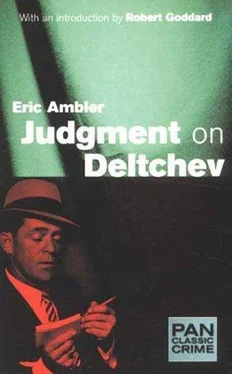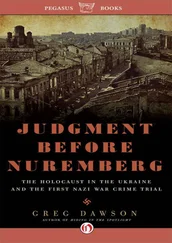Eric Ambler - Judgment on Deltchev
Здесь есть возможность читать онлайн «Eric Ambler - Judgment on Deltchev» весь текст электронной книги совершенно бесплатно (целиком полную версию без сокращений). В некоторых случаях можно слушать аудио, скачать через торрент в формате fb2 и присутствует краткое содержание. Год выпуска: 1977, ISBN: 1977, Издательство: Vintage, Жанр: Криминальный детектив, на английском языке. Описание произведения, (предисловие) а так же отзывы посетителей доступны на портале библиотеки ЛибКат.
- Название:Judgment on Deltchev
- Автор:
- Издательство:Vintage
- Жанр:
- Год:1977
- ISBN:9780307049971
- Рейтинг книги:4 / 5. Голосов: 1
-
Избранное:Добавить в избранное
- Отзывы:
-
Ваша оценка:
- 80
- 1
- 2
- 3
- 4
- 5
Judgment on Deltchev: краткое содержание, описание и аннотация
Предлагаем к чтению аннотацию, описание, краткое содержание или предисловие (зависит от того, что написал сам автор книги «Judgment on Deltchev»). Если вы не нашли необходимую информацию о книге — напишите в комментариях, мы постараемся отыскать её.
Judgment on Deltchev — читать онлайн бесплатно полную книгу (весь текст) целиком
Ниже представлен текст книги, разбитый по страницам. Система сохранения места последней прочитанной страницы, позволяет с удобством читать онлайн бесплатно книгу «Judgment on Deltchev», без необходимости каждый раз заново искать на чём Вы остановились. Поставьте закладку, и сможете в любой момент перейти на страницу, на которой закончили чтение.
Интервал:
Закладка:
Perhaps but for that nickname there would have been no People’s Party regime, and no Deltchev trial.
When the Provisional Government came into power, it was said by neglected members of his own party that the motives behind Deltchev’s actions had all along been those of a shrewd, ambitious politician and that, while he could not be blamed for having had greatness thrust upon him, he should not now behave toward his old friends as if he had achieved it. They were soon to wish that they had been entirely right.
One of the main articles of the Committee’s original programme had been that of insisting on the need for free elections at the earliest possible moment. Its inclusion and the sanctimonious style of its wording were concessions to Anglo-American susceptibilities, which, it had been felt, could hurt nobody. Not that the men of the Committee were cynically indifferent to elections; it was simply that, faced with the task of planning for a great emergency of which nothing was then known and only the worst could be expected, they found such talk unrealistic. A cultivated sense of emergency is not easy to discard and, later on, the early state of mind about elections tended to persist. When, therefore, the People’s Party members of the Provisional Government began to press for redemption of the election promise, their action was interpreted, and correctly interpreted, as a demand for more power; that is, a larger share of the important posts. Only to Deltchev, apparently, did it mean anything different.
The People’s Party had lately grown enormously in numbers and influence. The participation of the Agrarian Socialists in the formation and work of the Committee had achieved its object of enlisting wide popular support; but it had also had the secondary effect of making the Committee a powerful recruiting agency for the People’s Party. This mishap had long been a subject of complaints and bitter exchanges within the government, and on one occasion Petra Vukashin, the leader of the People’s Party men, had been too frank. ‘If,’ he had said, ‘you are fool enough to introduce your wife to a handsome young man with a bad reputation, you must not complain when you find them in bed together.’
When, to the manifest discomfort of Vukashin and the rest of the People’s Party faction, Deltchev took the election proposal seriously and began to argue in favour of it, it was assumed at first by his pathetically gleeful colleagues that ‘Papa’ Deltchev was merely calling the enemy’s bluff. They knew, had known for some time, that the Provisional Government had the approval and support of the Western powers, who would not press for the promised elections while the country was in Soviet occupation. They had evidence that the Russians, not unimpressed by Deltchev’s efficiency, were content to let things stay as they were for the present. Some of its members had even wondered if the word ‘provisional’ might not be dropped from the title of a government with so rich an expectation of life. They could not know that their leader, Deltchev, had already numbered its days.
Many attempts were made later to offer more reasonable explanations of Deltchev’s actions at that time than the one accepted by the simpler members of the public — namely, that he was a self-sacrificing patriot who had been directly inspired by God. Since, however, most of their other explanations relied on the assumption that he was monumentally corrupt, none of them was much more convincing.
The material facts were simple.
After the meeting at which the election promise was discussed Deltchev seemed preoccupied and unwilling to pursue the matter in private conversation. To one persistent man, however, he said, ‘If we have clean hands they cannot accuse us.’ The man took this to be a comment on the strength of the government’s position and the absurdity of the People’s Party manoeuvre.
That was on a Thursday. For the next few days Deltchev was at home in bed with a severe chill. On the following Tuesday he was due to make a radio speech about a national campaign then in progress for conserving winter foodstuffs for livestock.
He came to the radio station straight from his bed, looking, according to the director of the station, ‘Like a man who has been fighting with devils’. In his speech he talked briefly about the conservation campaign and then, after a momentary hesitation, produced a handwritten script from his pocket and began to read a statement from it.
Five minutes later the people knew that, in the considered opinion of ‘Papa’ Deltchev, the time had now come for the government to redeem the Committee’s solemn pledge to hold free elections at the earliest possible moment.
At the beginning of the statement he had declared that he was speaking only for himself and not for the Provisional Government of National Unity. This declaration was both seized upon as evidence of his cynical contempt for his audience and pointed to as marking his absolute integrity. For the former view it was said that no one but a fool would suppose that, whether he wanted to do so or not, Deltchev could in fact dissociate his private opinions on such a question from those of the government he led; for the latter it was argued that if you accepted the fact of his honesty (and who could deny it?) you would see that his disclaimer was a simple statement of the truth, which he had been bound to make if he were not to deceive the public. As equally divergent constructions could be placed on every other sentence in the statement, neither side could score points. Deltchev himself had returned from the radio station to his bed and, having issued, through his secretary, the statement that the broadcast speech was ‘self-explanatory’, remained there, silent and inaccessible. But by the time two days had passed, it was clear that the storm over the speech, which raged with mounting fury among the politicians, was no longer of interest to the people. In their eyes the Provisional Government was now committed quite irrevocably to holding elections in the near future and anyone who attacked Deltchev was attempting to deny the fact. Yet it was the People’s Party which profited most from the situation.
Those of the unfortunate Agrarian Socialists who had the wit to see that, whatever they might now say in private about Deltchev, they could not hope to win without him as a figurehead were in the majority; but they were terribly hampered by a considerable and vindictive minority whose only concern now seemed to be to oppose and revile him in public. The People’s Party, while taking full advantage of this mistake, took care not to make it themselves. By referring to Deltchev patronizingly but respectfully as a kind of elder statesman (he was in fact only sixty then) they managed to convey the impression that he was in a state of derelict senility, which could excuse his continued association with the Agrarian Socialists. Also, by securing the postponement of the elections until the early summer, they gave themselves time to prepare a coup d’état that anticipated publication of the election results by a few hours. In the event, it was almost unnecessary. Thanks to Deltchev, they very nearly came into power by constitutional means.
His response to these events was at first curiously passive. True, he protested against the coup d’état , but rather formally, as if expressing an appropriate but not heartfelt sentiment; and in the chamber his attacks upon the new government had about them the studied moderation of a fencing master with a new pupil. For a long time he seemed unaware or unwilling to be aware of the government’s quick, wary moves to make themselves secure. Soon the anti-Deltchev faction within his own party began to find people ready at last to listen to their tale of a great fortune deposited abroad in Deltchev’s name the day after his election statement. Even among the general public he seemed to be losing popularity. It was understandable that the government’s supporters should have come to think of Deltchev almost as one of themselves.
Читать дальшеИнтервал:
Закладка:
Похожие книги на «Judgment on Deltchev»
Представляем Вашему вниманию похожие книги на «Judgment on Deltchev» списком для выбора. Мы отобрали схожую по названию и смыслу литературу в надежде предоставить читателям больше вариантов отыскать новые, интересные, ещё непрочитанные произведения.
Обсуждение, отзывы о книге «Judgment on Deltchev» и просто собственные мнения читателей. Оставьте ваши комментарии, напишите, что Вы думаете о произведении, его смысле или главных героях. Укажите что конкретно понравилось, а что нет, и почему Вы так считаете.












